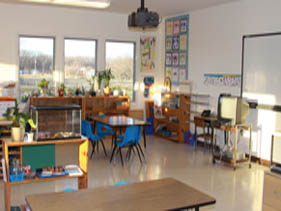Elementary Program

The elementary program builds on the Montessori preschool experience. As in the preschool,
the Montessori materials are intended to evoke the imagination, to aid abstraction, and to
generate a worldview about the human task and purpose. The child works within a philosophical
system, asking questions about the origins of the universe, the nature of life, and people and their
differences. The environment reflects a new stage of development and offers the following:
-
Integration of the arts, sciences, geography, history and language that evokes the natural imagination
and abstraction of the elementary child.
-
The use of time lines, pictures, charts and other visual aids to provide a linguistic and visual
overview of the first principles of each discipline.
-
Mathematics curriculum is presented with concrete materials that simultaneously reveal arithmetic,
geometric and algebraic correlations. The curriculum recognizes the child's need for experience, for
repetition, from various levels of concreteness, for going from concrete to symbol to abstraction. It
offers practical application of mathematical principles
-
An emphasis on creative writing, expository writing, interpretive reading of literature, research
with primary sources, grammar and sentence analysis, and oral expression for both sharing research and
dramatic productions.
-
Emphasis on open-ended research that is student-generated and teacher-guided. Students are
encouraged to wonder, to carry out research, to experiment, to develop knowledge, to make observations,
to demonstrate skills.
-
"Going Out" to make use of community resources beyond the four walls of the classroom.
-
Studies are integrated not only in terms of subject matter but in terms of moral learning as well,
resulting in appreciation and respect for life, moral empathy, and a fundamental belief in progress, the
contribution of the individual, the universality of the human condition, and the meaning of true justice.